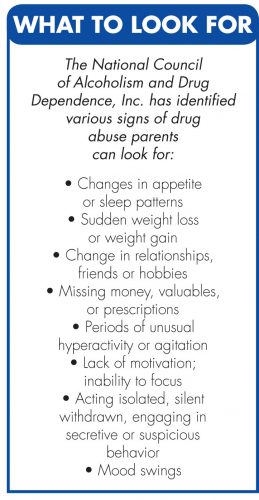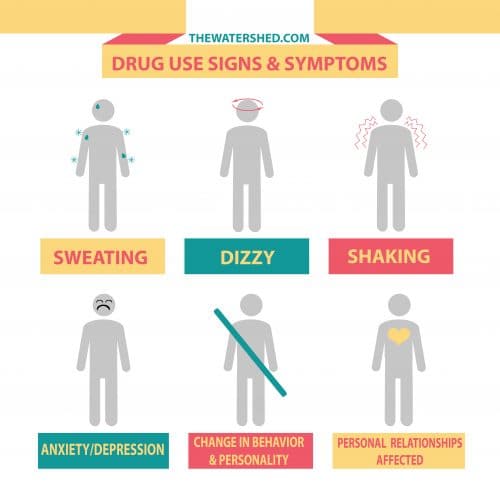Overview
How do you know if someone is addicted to drugs? Is it drug use, or is it a chemical imbalance? How can both be addressed to prevent the causes of drug use? Learning the signs of drug use can help you identify when a person needs help, and will give you some basis as to how to communicate with them about their drug use.
While it is easy to detect changes in people we haven’t seen in ages, identifying signs of drug use in people we see each day is a bit more tricky, because the changes appear more gradually. The key to understanding how drug use affects the body is in how these changes appear both physically, and through the behaviors of the user.
Ready to order or have questions? DrugTestsInBulk.Com has a professional staff ready to answer your questions and to help you place your order today. Call us today at 866.461.7806. Ask us about our special pricing and how you can sign up to receive our newsletter and product promotions. Call Today!
The following signs are common ways to tell if someone you know might be using drugs. These signs of drug use can be found in one’s physical appearance, personality traits, social interactions, energy levels, and bodily changes. Getting a friend, family member, or coworker help is not always the easiest task, but one that could save his or her life. Here are some clear indicators that drug use may be taking over the life of someone you know.
Significant Changes in Appearance
Those who take drugs show physical signs of aging that appear more rapidly than those who are not on drugs. While much of our aging has to do with genetics and other lifestyle choices such as diet and exercise routines, if you come across someone who appears to have become significantly older in a relatively short period of time, drugs may be the reason.
Other physical changes in appearance have to do with the immediate effects drugs have on the body. Bloodshot eyes, widely dilated or constricted pupils, slurred speech, difficulty with coordination and difficulty standing upright are clear signs of drug use. Less apparent but telling signs are seeing scars or “track marks” on areas where drugs are injected, such as on the inside of the arm. Also frequent nosebleeds, raw sores on the face, blisters that might be due to burn marks on the lips or cheeks, unexplained bruises, and a red, raw nose are common visual signs of drug use.
Long term physical effects of drug use include clammy, pale and/or puffy skin, adult acne, changes in natural sleep patterns (are they unusually jittery in the morning and restless at night?), excessive sweating, frequent coughing, nausea, and vomiting. These are all frequently seen symptoms of withdrawal.
Loss of Personal Accountability
Learning to take personal responsibility for one’s own behavior is one of the many rites of adulthood. When that sense of ownership and accountability is lost, this may be a sign that the person is struggling with an addiction to drugs. When drugs take the center stage of a person’s life, everything else becomes in service to their addiction. Relationships, leisure activities, and hobbies now all must be compatible with drug use. So long as an obligation doesn’t conflict or compete, many drug users can continue to function in their daily routines.
Being able to complete day to day functions while using drugs is a dangerous thing, because these highly functioning addicts are less likely to be identified and treated for their relationship to substance abuse. However, when an obligation is in direct conflict with the addiction, such as when an employer does a routine drug testing, this forces the person to take personal accountability for their drug use. This puts the person in a position where they wish to justify their drug use, which is one of many ways addicts try to release themselves from personal accountability.
For a full blown addict who is not able to function, a drug becomes an escape route from responsibility. But instead of coming right out and saying “I can’t ever show up to things on time or do what I say I’m going to do because I am struggling with a drug addiction”, outsiders are more inclined to hear a variety of excuses, some far-fetched, and some that are vague.
Those who suffer from a loss of personal accountability as a result of drug use tend to perform poorly in work and school, miss scheduled appointments, seem to have an increased need for privacy, and suffer from memory loss and frequent episodes of forgetfulness. When a person you know consistently suffers with being on time and personal accountability, and is constantly apologizing but not making improvements, they might be under the influence of a substance abuse problem.
Withdrawal from Friends and Family
Friends and family are the most likely to be able to tell when a person is using drugs, because they already know what is considered normal behavior for that particular person. This is why, when people start abusing drugs, they tend to create distance between themselves and people who might question, disapprove, or challenge their behavior.
When a close friend or family member stops loving things such as hobbies, music, and activities they have always loved, loses interest in maintaining relationships that they have ordinarily kept, or seems to have withdrawn from their norm into a life of solitude, then it is time to consider that they might have started using drugs.
These signs usually come in addition to the other signs of drug use discussed here. Withdrawal and association with new people who also exhibit signs of drug use is a sure cause for concern that your friend or family member may need help.
Extreme High and Low Behaviors
When interaction with a person who is on drugs, having an idea of the physical changes that occur will help to avoid confrontations that may occur as a result of drug use. Some drugs cause people to become very aggressive and argumentative – those who ordinarily would not resort to physical violence might find themselves out of control.
When extreme highs and lows in behavior are present, and when a person’s personality seems to sway between the two extremes, it may be a chemical imbalance, or it might be due to the imbalances that are created with drug use.
If a person you know is exhibiting such behaviors, particularly aggressive ones, proceed with caution. Don’t instigate or provoke a person who appears to have lost control of their behavior. Alternatively, some people become completely lethargic when they are on drugs. When a person appears to have no energy, it is still important not to provoke them, because the other side of the extreme might come forward if the person on drugs is challenged.
Unexplained Weight Loss or Weight Gain
Those who have participated in weight management programs will share their experiences of having more energy and feeling great as a result of gaining or losing weight. Skin tends to be glowing and dewy, and their features become more filled in or defined. Those who change weight due to healthy choices often show other signs of healthy habits, such as an increase in water consumption, or talking about their exercise routines.
When weight fluctuations are due to drug use, conversely, the benefits of changes of weight are not accompanied by the benefits of increased energy and good feelings, at least not in the long run. Weight loss or gain that occurs as a result of drug use happens in abundance – those who lose weight do so to the point of visible bones, and those who gain weight do so to the point of having clammy, bloated skin, heart palpitations, and frequent sweats.
These extreme fluctuations are usually the sign of prolonged drug use of the same drug, which means that an addiction could be present. You will NOT ordinarily see a person adopting other healthy weight management habits like enjoying healthy snacks, choosing to drink water instead of sugary drinks, or attending yoga in the park if the cause for their weight changes are related to substance abuse.
A Noticeable Increase or Decrease In Appetite
Changes in appetite are uncommon in older adults, unless there is a reason for such changes. Some people naturally eat less when they are under stress, and some do the opposite by “eating their feelings”. While these changes could be totally normal among people who do not use drugs, it is still worth noting the relationship between consumption of drugs, and how drugs affect one’s appetite.
How these changes take place really depends on the type of drug being taken. Marijuana, for instance, in notorious for causing “the munchies”. Users of marijuana tend to seek out foods that satisfy an emotional appetite. On one hand, this is why medical marijuana is used by some cancer patients who have trouble getting enough to eat. But when marijuana is being abused, repeated cases of eating binges cause a decline in health and weight gain. Other physical symptoms, like a decrease in physical activity, and changes in the texture of the skin (such as a development of acne, clammy, or matte texture) give away clues that toxins are being ingested.
Stimulant drugs that increase one’s energy or decrease appetite like methamphetamines, heroin, ecstasy, and cocaine, work in the opposite direction. Many people who use these drugs lose their appetite while the body continues to burn through it’s natural energy in order to survive. Weight loss is sustained and increases so long as the addict continues to use the drug. The central nervous system takes the hardest hit from using these stimulants, and can take a long time to recover.
Withdrawal Symptoms
Symptoms of withdrawal vary with the drugs being used, but there are some drugs that take longer than others to clear through the system. Opiate and Heroin users may exhibit symptoms that mimic the flu, and experience muscle aches, anxiety, insomnia, and frequent yawning. During late withdrawal, users might experience chills, diarrhea, abdominal cramping, and vomiting due to nausea.
Cocaine withdrawal symptoms tend to be fairly visible, since users experience a “crash period” between 9 hours and up to 4 days after using the drug. Someone who is experiencing withdrawal symptoms from cocaine might experience a notable increase in appetite, and seem depressed or agitated. After a week of using cocaine, the withdrawal symptoms continue, as users suffer from irritability, insomnia, fatigue, and strong cravings. After three weeks, users will continue to have signs of cravings with continued depression, and might even begin to have thoughts of suicide.
Proceed with Caution
There is no one tried and true methods for treatment for a drug addiction because the causes of addiction are very personal. Drug addiction is now considered a brain disorder, and can be very hard to diagnose because a drug problem usually accompanies another mental disorder like depression, anxiety, or bipolar disorder.
Several factors make some people more prone to developing a drug addiction than others. People who have grown up around family members or friends who use drugs are more likely to become users. An excess of discipline from guardians, or an absence of discipline therein can cause some to use drugs. Peer pressure, while one of the most well-known causes of drug use, continue to play a significant role in the development of addictions. When students are struggling with academics or seem to have an absence of personal drive, they are more inclined to take up drugs as a recreational pastime. Finally, those who are prone to being rebellious risk-takers, along with their antisocial counterparts are also more prone to using drugs.
How to Encourage Others To Get Help
Getting a friend or loved one help with a drug problem is not as easy as suggesting they seek help. Many people who use drugs might prefer to deny that their frequent drug use is anything more than recreational. Because drug addiction is considered a brain disorder, getting psychiatric help is a good first step. If a person appears to be incapacitated, then taking them into the emergency room will get them a routine examination, and upon finding drugs in the system, doctors may require that they attend a rehabilitation facility and follow-up with regular counseling, or join a support group.
There is no shame in suffering from an addiction, and there is much to celebrate when a friend or loved one finally makes the steps towards getting help for a drug problem. Spotting the signs of drug abuse, showing concern, and helping users realize that addiction is not a normal part of life will empower the next steps toward recovery.




